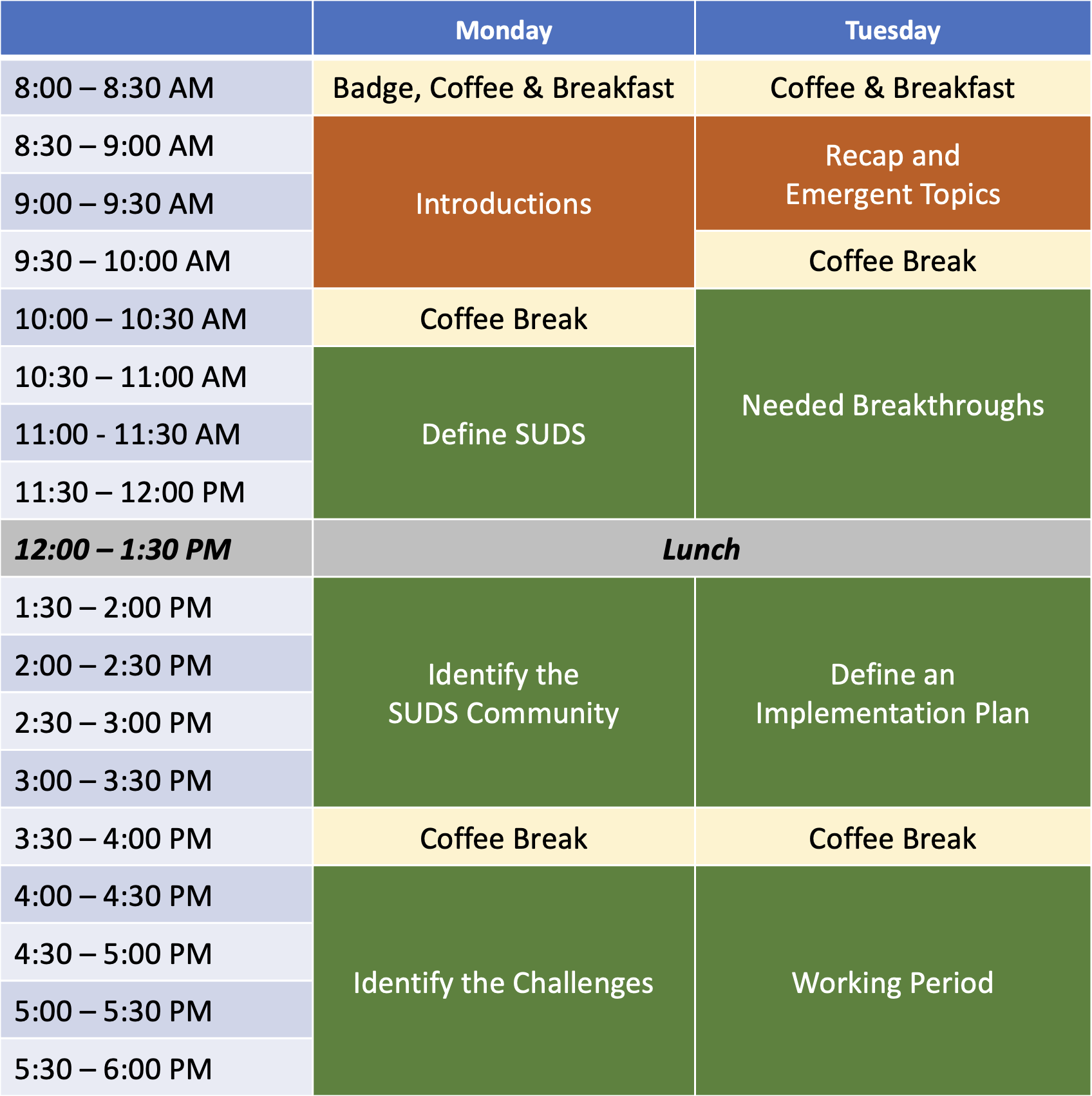- SUDS Workshop
- Workshop Agenda
SUDS Workshop
Recent interdisciplinary collaborations between physical scientists and data scientists have yielded significant advancements in both fields. In order to define, prioritize, and unify our vision for these high-value collaborations across institutions, we invite SUDS leaders across institutions to participate in this first-of-kind workshop.
- Workshop: August 19-20th, 2023
- Location: Keck Center, California Institute of Technology, Pasadena, CA
- Attendees: 30 participants by invite only
If you were invited, please refer to your invitation to register. If you were not invited but are still interested in contributing to this workshop, please reach out to us at sudsconf@jpl.nasa.gov, but space is very limited.
Conversation Facilitation
- Lukas Mandrake (NASA/Caltech JPL; Earth Data Science and Technology)
- Erika Podest (NASA/Caltech JPL; Carbon Cycle and Ecosystems)
- Ryan McGranaghan (NASA/Caltech JPL; Machine Learning and Instrument Autonomy)
- Chris Bard (NASA Goddard; Center for HelioAnalytics)
- Rajesh Gupta (UC San Diego; Halıcıoğlu Data Science Institute)
- Amy McGovern (University of Oklahoma; AI2ES NSF AI Institute)
- Barbara Thompson (NASA Goddard; Center for HelioAnalytics)
Please see this page for our complete steering committee.
Workshop Agenda
Schedule at a Glance

Monday, August 19th, 2024
8:00 Badging, Coffee, and Breakfast
8:30 Introductions
8:30AM - 10:00AM PST (90 min), Keck Center, Caltech
Facilitated by Lukas Mandrake (JPL), Sue Owen (JPL)
Objective
The workshop organizers will provide an overview of the history of SUDS, workshop visions and goals, and create an environment of meaningful and open discussion.
10:00 Coffee
10:30 Define SUDS
10:30 AM - 12:00 PM (90 min), Keck Center, Caltech
Facilitated by Lukas Mandrake (JPL), Sue Owen (JPL)
Objective
This session aims to achieve a collective understanding of our purpose, define and contextualize SUDS as a technology, research area, science, and multi-disciplinary effort, and develop a universally comprehensible articulation of SUDS that makes sense to everyone.
Questions
- Why are each of us here? What do we personally value and what patterns do we see of shared values across the team?
- Where are we starting from? Whic path forward is the most important to us as a team?
- How can we change our culture to value social sciences and interdisciplinary work?
- How do we define collaboration, coordination, and co-creation?
Deliverable
- A clear, concise statement of purpose for the work going forward
12:00 Lunch
1:30 Identify the SUDS Community
1:30 PM - 3:30 PM (120 min), Keck Center, Caltech
Facilitated by Ryan McGranaghan (JPL) and Amy McGovern (NSF AI2ES)
Objective
Identify the SUDS Community and its range of activities and achieved successes. Determine common elements and relationships, forming a network of participating institutions, their areas of expertise, thrust areas, and points of contact.
Questions
- What is our process for building community and carrying out shared decision making?
- Who is the SUDS community nationwide?
- How do you find the others willing to work across interdisciplinary collaborations?
- What does a healthy SUDS community look like? What can we learn from other highly collaborative communities?
- What conditions made it possible for attendees of this workshop to be engaged in this kind of collaborative effort?
- (e.g. support from their institution, a particular funded position, etc.)
- What program managers or institutional leaders can provide top-level support for the SUDS community?
- Who else should we be reaching out to?
Deliverables
- List of key institutions and groups doing SUDS research
- List of common elements that connect the various communities
- Preliminary organization of entities and relationships into a network
- Mechanisms in place for SUDS members to learn from each other and communicate going forward
- A shared understanding of how to sustain and expand a healthy SUDS community
2:30 Coffee
4:00 Identify the Challenges
4:00 PM - 6:00 PM (120 min), Keck Center, Caltech
Facilitated by Barbara Thompson (NASA GSFC) and Rajesh Gupta (UCSD)
Objective
Identify the challenges to SUDS in represented institutions and communities. Articulate failure modes that have been observed and discover the underlying causes.
Questions
- How are SUDS projects evaluated?
- What are appropriate metrics for SUDS proposals (e.g. interdisciplinary journals)?
- What are the communication barriers between physical science and data science?
- What are limitations in our current employment categories when it comes to meeting emerging complex research needs?
- What are the traditional definitions of the various roles relevant to SUDS research?
- What are the inadequacies of those existing roles for modern research?
- What new roles are required/emerging (e.g., Research Software Engineers, Science Community Managers)?
- How do we normalize considerations of the relational/social/cultural elements of collaboration in our scientific exchanges?
- What are additional efforts required to do SUDS research, as opposed to more traditional research?
- What resources are available to us (time, funding, community engagement)?
- How do we get funding agencies onboard?
Deliverables
- Measures and indicators to appropriately evaluate SUDS efforts
- Definitions of new roles useful for SUDS efforts
- Justifications for these efforts to influence policy-makes/funders/institutional leadership
- Shared community resources for continued interactions
6:15 Dinner
Saladang Garden
383 S Fair Oaks Ave, Pasadena, CA 91105
Tuesday, August 20th, 2024
8:00 Coffee and Breakfast
8:30 Recap
8:30 AM - 9:00 AM (30 min), Keck Center, Caltech
9:00 Reorientation
9:00 AM - 10:00 AM (60 min), Keck Center, Caltech
10:00 Coffee
10:00 AM- 10:30 AM (30 min), Keck Center, Caltech
10:30 First Draft of Convergence Concepts
10:30 AM- 12:00 PM (90 min), Keck Center, Caltech
12:00 Lunch
12:00 AM - 1:30 PM (90 min), Keck Center, Caltech
1:30 Second Draft of Convergence Concepts
1:30 PM - 3:00 PM (90 min), Keck Center, Caltech
3:00 Coffee
3:00 PM - 3:30 PM (30 min), Keck Center, Caltech
3:30 Formalization of Convergence Concepts
3:30 - 5:00 PM (90 min), Keck Center, Caltech
5:00 Working
5:00 onwards, Keck Center, Caltech